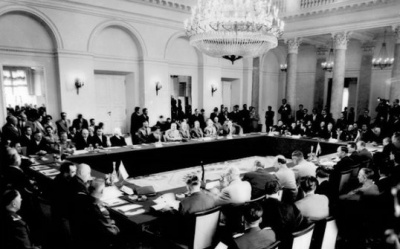Difference between revisions of "The signing of the Warsaw Pact"
| Line 1: | Line 1: | ||
=== May 14, 1955 === | === May 14, 1955 === | ||
[[File:20thMay14.jpg|400px|thumbnail|left]] | [[File:20thMay14.jpg|400px|thumbnail|left]] | ||
| − | The Soviet Union retaliates to West Germany's membership in NATO by founding a mutual defence treaty called the Treaty of Friendship, Cooperation and Mutual Assistance, commonly known as the "Warsaw Pact". Eight Soviet states, including East Germany, subscribe to the Treaty. From this point Warsaw Pact countries and NATO states work to increase their influence within the wider context of the [[Cold War]], although they never directly wage war against one another. | + | The Soviet Union retaliates to West Germany's membership in NATO by founding a mutual defence treaty called the Treaty of Friendship, Cooperation and Mutual Assistance, commonly known as the "[[Warsaw Pact]]". Eight Soviet states, including East Germany, subscribe to the Treaty. From this point Warsaw Pact countries and NATO states work to increase their influence within the wider context of the [[Cold War]], although they never directly wage war against one another. |
[[Category:20th Anniversary of German Reunification]] | [[Category:20th Anniversary of German Reunification]] | ||
Latest revision as of 09:24, 1 April 2014
May 14, 1955[edit]
The Soviet Union retaliates to West Germany's membership in NATO by founding a mutual defence treaty called the Treaty of Friendship, Cooperation and Mutual Assistance, commonly known as the "Warsaw Pact". Eight Soviet states, including East Germany, subscribe to the Treaty. From this point Warsaw Pact countries and NATO states work to increase their influence within the wider context of the Cold War, although they never directly wage war against one another.
